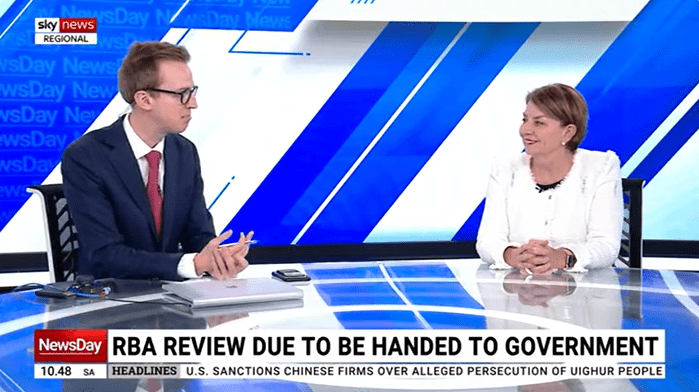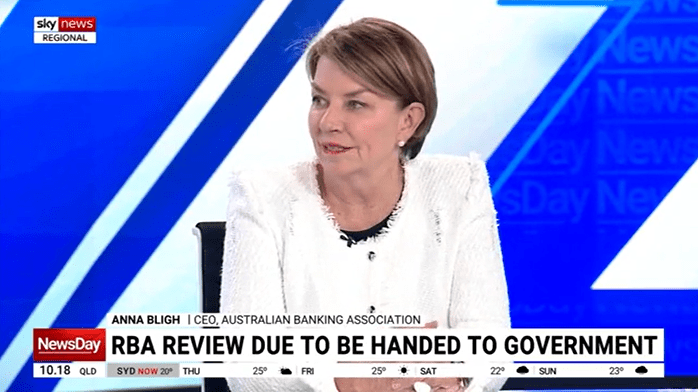4 April 2023
“it’s a very competitive environment out there at the moment, there’s about 2400 Australians every single day refinancing every working day, have been for six months, it’s the highest rate of refinance we’ve ever seen in Australia. So you’re right, people are going out and getting a better deal”
ABA CEO, Anna Bligh
TOM CONNELL: Welcome back. Well, we’ve got a major review of the RBA. It’s due to be handed to the government tomorrow, or perhaps get a response in the ensuing days. But it will be fascinating reading given of course, the actions of the RBA has been somewhat criticised, perhaps missing inflation on the way up, is it best fit for purpose going forward? Anna Bligh from Australian Bankers Association joins me now. Interesting review. What’s your view on the bank? Do you think its performance could be changed? Its parameters, the makeup, the experience of the board? What’s your view?
ANNA BLIGH: Well, I think every bank and I think a lot of people in Australia will be very interested in the report coming down tomorrow. For all the obvious reasons, most people think about the RBA, for the interest rates, which of course is an important lever in the economy. But the RBA plays many other roles as well, they also they oversee our currency, and they also oversee our payment system. And those two things are not going to look the same in five or 10 years time as they do now. So I think it’s a very opportune time to consider the role of the bank and its ability to meet its, to be future fit, if you like. So this is the first review in 40 years, I would hope I would expect every organisation from time to time can benefit from an external review and think about what does that need going forward?
TOM CONNELL: And the world has changed since then with crypto…
ANNA BLIGH: Yes, that’s right. So you know, what is money? is going to be a question. In every country in the next five to 10 years. RBA is already looking at a central bank, digital currency, as are other central banks in the world. So I do think, obviously, interest rates will always be something that matters pretty much to every Australian, and is a big and important lever in the economy, but it’s not the only role of the RBA and I think this report is going to be very comprehensive.

TOM CONNELL: We’ll see. I’m sure we’re talking about it after that. You mentioned interest rates, and we feel like we’re just about at the end of the cycle increases here – are you willing to call that?
ANNA BLIGH: Well, I think at the moment, the economists are literally 50-50 on it Tom, so I’m not going to jump into that argument.
TOM CONNELL: But get a headline?
ANNA BLIGH: What the governor himself has said is and this is self evident, that they’re getting closer to the end of the cycle, whether that’s next week or next month. Every time it lifts, you’re getting one closer to when the pause starts or the monetary policy starts to pull back. I do think that the inflation figures yesterday, the employment figures, the retail spending figures, these are all things that they’ll take into account, they’ve indicated that a pause is somewhere on their agenda, whether it’s next week or not, is, as I said, 50-50 looking at the economist, but it’s important, I think, to remember that there is a 2-3 months, but on average, a three month lag between when the governor announces a rise, and when it actually hits people’s hip pocket, and it appears on their mortgage. Then there’s people given 32 days notice in writing, so by the time all that happens, so most people are only paying the November increase. They’ve still got the December, the February and the March increase.
TOM CONNELL: How much of a concern is that when your, i mean banks must closely monitor foreclosures, that really are the end of the road? How big a concern is the cohort moving towards that, that are starting to struggle minimising payments for savings buffers gone. Is it a concern that number at the moment?
“it’s important, I think, to remember that there is a 2-3 months, but on average, a three month lag between when the governor announces a rise, and when it actually hits people’s hip pocket, and it appears on their mortgage.”
ABA CEO, Anna Bligh
ANNA BLIGH: not at the moment, but banks are acutely aware that as the next three take effect, and possibly more? It’s where does it peak? And more importantly, how long will it stay at peak? Because at the moment, they’re not seeing any significant lift in applications for hardship, the 90 day default rate has not really moved. But as I said, there’s still three to come. And then potentially a prolonged period where people are paying at the peak. Banks are keeping a very close eye on it very being very proactive and ringing customers that look like they might be in trouble. They’re keeping a very high, very close eye on those people who borrowed in the last couple of years at the top of the cycle, and who went to the limit who have a high ratio.
TOM CONNELL: And so a lot of those people are coming off fixed rates, and they get to so called mortgage prison because of the APRA buffer rule. Now we know why it applies to new loans. It’s about risk in the economy that you want someone to take out a loan and be able to pay it off. What about refinancing does this rule really need to be looked at because if you’ve had a loan, you’ve paid it off for three years, you’ve shown that ability and your buffer is 1.5%, shouldn’t you be able to go out and refinance?
ANNA BLIGH: Well, there is sufficient flexibility in the regulation for banks to refinance their own customers. So to refinance with your own bank, at a lower rate
TOM CONNELL: But we know competition is what really helps here. Can say, realistically, it’s a commercial operation, you’re not going to be able to go and shop elsewhere. So we need to be allowing people to shop elsewhere in that situation.
ANNA BLIGH: Well, at this stage, we’re not seeing any evidence of people not being able to get a sufficiently reduced price from their own bank. As I said, we’re not seeing 90, even 60 day default rates are not rising with any sort of significance at the moment, that would tell you that people can’t get a lower rate, and we’re not seeing that evidence.
TOM CONNELL: Well not necessarily, they’ll tell you, they can’t get a lower rate and they’re about to hit a breaking point, as you say, we’ve still got more interest rates, right? Isn’t it also just about not just avoiding foreclosure, or delaying making payments, but anyone out there struggling and going, I wish I could get a percent off my loan, but I’m trapped with my same bank that doesn’t that refinance, for all the buffer rule on refinancing not make sense?
“if someone is in circumstances where they’re really struggling to make a payment, and they’re in hardship, banks have got a whole lot of things in the toolkit”
ABA CEO, Anna Bligh
ANNA BLIGH: I think there’s, there’s a couple of different things, there are people who are not in hardship, not necessarily doing it really tough, but things feel a bit tight, who are in a good position to renegotiate a good price on the loan with their own bank. They’re known to that bank. I mean, in the context of the volatility and global banks in the last couple of weeks, I think, our Prudential regulator, we can give them a big tip for keeping Australian banks out of that volatility by some of these sort of Prudential rules. But if someone is in circumstances where they’re really struggling to make a payment, and they’re in hardship, banks have got a whole lot of things in the toolkit. You’re absolutely right repossession and foreclosure is an absolute last priority last resort. There’s no commercial interest for banks in repossessing someone’s house, the best thing for the bank, the best thing for the customer is look through the current situation. They’ve been a good payer, how do we get them to the other side of high interest rate environment? So they can defer payments? They can put them on interest only? They can restructure the length of the loan
TOM CONNELL: That means they’ll only offer a higher interest rate, though, as well, doesn’t it?
ANNA BLIGH: No, not always
TOM CONNELL: You’re not going to get a discount rate though when you’re going to interest only are you?
ANNA BLIGH: Well, it depends on the circumstances, but if you move to interest only for a short period, you’re not paying principal, then your repayments are significantly reduced.

TOM CONNELL: Yeah but i’m just saying when you get to the end of it, you’re well behind the eight ball compared to if you could maybe to have paid off your loan with half percent off it because you could refinance?
ANNA BLIGH: Well, if it’s a question of half a percent, I’d argue that that customer will get that with their bank. I mean, it’s a very competitive environment out there at the moment, there’s about 2400 Australians every single day refinancing every working day, have been for six months, it’s the highest rate of refinance we’ve ever seen in Australia. So you’re right, people are going out and getting a better deal. And we’re certainly not getting any complaints about people not being able to get a better deal. That might come though Tom,
TOM CONNELL: Let me ask very briefly, I’m getting the wrap. Would you be comfortable that banks could manage any so called increased risk of APRA relaxed, just the refinance buffer? 3%.
ANNA BLIGH: Look, I think there’s there’s complexity in that now, if it gets to a very different place than we are now. I think APRA has proven to be flexible over COVID. And there might need to be some discussions, but frankly, I can’t see those circumstances right now. And in the context of global volatility, we’re going to have to balance competition, customer hardship and stability. And that’s, you know, that’s always a bit of a balancing act.
TOM CONNELL: All right. Look, I think it’s interesting issue. I’m certainly hearing it anecdotally. We’ll see if it shows up in larger figures Anna Bligh, thanks for your time today.
ANNA BLIGH: Thank you.
Latest news
Australian banks have today unveiled their latest scam fighting technology, with the launch of Confirmation of Payee – a new name-matching service designed to help protect customers from being tricked into sending money to criminals. Banks have invested $100 million in this new technology which is a key initiative of the sector’s Scam-Safe Accord –… Read more »
Former Federal Finance Minister and Senate Leader, The Hon. Simon Birmingham, will join the Australian Banking Association as Chief Executive Officer. ABA Chair and National Australia Bank CEO Andrew Irvine today announced Mr Birmingham’s appointment, replacing retiring CEO, The Hon. Anna Bligh AC. “We are delighted to have Simon lead our industry and help ensure… Read more »
Rick Hind: Anna Bligh is the CEO of the Australian Banking Association. Welcome back to 105.7 ABC Radio Darwin. Anna Bligh: Good morning, great to be with you. Rick Hind: Is it getting easier to scam people out of money from their bank accounts? Given how good technology is, the scammers seem to have as… Read more »
